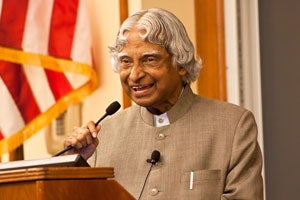It was hard to see him though the cheering crowd when he first walked in, a small, amiable-looking man. By the end of the session, he had gotten his message across about the importance of global leadership and youth empowerment. He was even able to get a room full of people to recite poetry with him. He is Dr. A. P. J. Abdul Kalam, the 11th president of India.
On Wednesday, Sept. 28, 2011, Harvard Law School’s Program on the Legal Profession and the South Asia Initiative at Harvard University—in association with Harvard India Student Group, Harvard South Asia Association, Harvard Pakistan Student Group and the South Asia Business Association (Harvard Business School)—organized the lecture, where Kalam, spoke about “Leadership, Youth and Global Engagement.” The lecture took place at Austin North at the Harvard Law School campus. Prerna Singh, associate professor of government at Harvard University, acted as the moderator.
In his opening remarks, Erik Ramanathan ’96, executive director of the Program on the Legal Profession, said his program, an academic think tank on the evolving global legal profession, chose to sponsor the event “to honor the tremendous influence that lawyers and legally trained leaders … have had on the foundation and development of the modern Indian state.”
Kalam, in addition to being the former president of India (term: 2002 to 2007), is an aerospace engineer. After graduating from the Madras Institute of Technology, he joined the Defense Research and Development Organization and, later, the Indian Space Research Organization. He made a major contribution in developing India’s first indigenous Satellite Launch Vehicle (SLV-III), which successfully launched the Rohini satellite in July 1980. He was the scientific adviser to defense minister and secretary, Department of Defense Research and Development from July 1992 to December 1999. During this period he led the weaponization of strategic missile systems and the Pokhran-II nuclear tests in collaboration with the Department of Atomic Energy, which made India a nuclear weapon state.
Amongst his numerous achievements is the founding of India Millennium Mission 2020 which charts a roadmap for transforming India into not only a developed nation but also a global super power. As a Professor of Technology and Social Transformation at Anna University, Chennai, he embarked on a new journey to empower the Indian youth for the purposes of national development. He has written several critically acclaimed books, received honorary doctorates from over 40 universities and institutions worldwide, and is the recipient of various prestigious awards, including the Bharat Ratna, the highest civilian award in India.
Kalam started his lecture by recounting many of his childhood memories and the lessons he had learned along the way. He took the audience back to 1941 when his father taught him the important lesson of being grateful to God and not receiving any unsolicited gifts. He also spoke of how he realized the joy of giving when he was able to utilize material from the Agni Missile to design lightweight calibers for Polio patients.
After his talk, Kalam took questions spanning a wide range of issues, from transparency in the Indian Government to India’s image as the “Playground Bully” for the surrounding nations to the role of science in politics and India’s nuclear power. The event ended with Kalam reciting a poem on empowerment, with audience members lending their voices in participation.
The Program on the Legal Profession, under the direction of HLS Professor David Wilkins and Executive Director Erik Ramanathan, is currently involved in a multiyear research initiative on Globalization, Lawyers and Emerging Economies, which seeks to study the development of the Indian legal profession and draw parallels and distinctions to what is happening in Brazil and China and elsewhere on the global stage.
—Shahmuddin Ahmed Siddiky
